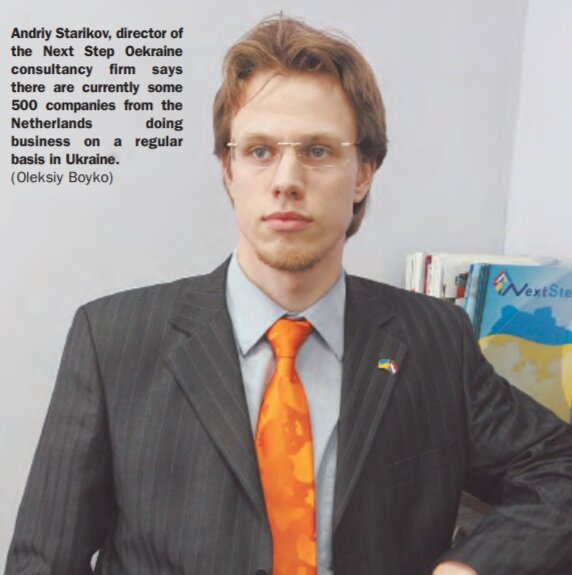Analysts say Dutch companies tend to begin investing more in Ukraine after experiencing a number of successful years in trade or outsourcing activities.
One of the major achievements in business relations between Ukraine and the Netherlands is the continuous growth of bilateral trade volume. And with each passing year, more and more Dutch companies are doing business in Ukraine.
Last year the small European kingdom was Ukraine’s fifth largest investor, accounting for 7 percent of total foreign investments in 2006.
Bilateral trade relations have been especially active in agriculture, irrigation water treatment, technological industry and industrial machinery, transport and logistics, IT, education, construction and energy. Ukraine is also an important supplier of wood and metal to Dutch companies.
Although there are a number of risks connected with transparency of business activities in Ukraine, the country remains a very attractive market for Dutch companies, which often make well-grounded, long-term strategic decisions to establish subsidiaries in Ukraine, rather than in one of the Baltic, or other Eastern European states.
Analysts say Dutch companies tend to begin investing more in Ukraine after experiencing a number of successful years in trade or outsourcing activities.
Most successful, according to experts, are small and medium-sized enterprises (SMEs), because large companies usually have more difficulty in adapting their internal regulations to Ukraine’s legal norms. SMEs are more flexible and capable of facing local challenges.
According to Andriy Starikov, director of the Next Step Oekraine business consultancy, which specializes in providing support to Dutch companies in Ukraine, in 2005 the trade volume between the Netherlands and Ukraine grew by 60 percent year-on-year to a total of 840 million euros.
According to the State Statistics Committee, in 2006 the Netherlands was rated fifth in terms of foreign direct investments into Ukraine. Last year FDI from the Netherlands totaled nearly $1.5 billion, a 40 percent increase compared to 2005.
At the same time, this figure does not reflect investments made solely by Dutch companies, since the Netherlands’ favorable tax regime allows international businesses to make investments via the kingdom.
Ihor Olekhov, an associate with the Kyiv office of the Baker & McKenzie law firm, said that many US, British, Russian, and even Ukrainian businesses invest into Ukraine through Dutch holding companies especially established for this purpose. The practice is permitted by multilateral agreements between Ukraine, the Netherlands and other countries. The arrangements allow companies to avoid double taxation.
There are currently about 500 Dutch companies doing regular business in Ukraine, that is, conducting regular transactions or owning a subsidiary company in Ukraine, said Starikov.

Andriy Starikov, director of the Next Step Oekraine consultancy firm says there are currently some 500 companies from the Netherlands doing business on a regular basis in Ukraine. (Oleksiy Boyko)
Arno Klijbroek, director of the Dutch consultancy company AJK, which has been operating in Ukraine since 2000, said that the interest of Dutch business toward Ukraine has grown considerably since the Orange Revolution of 2004.
Concerning potential difficulties in business relations between the two countries, Starikov pointed to different business cultures and the more democratic structure of Dutch companies compared to the strict hierarchy of Ukrainian ones.
“Generally speaking, Dutch businessmen have a more long-term vision and are project-oriented in comparison with their short-term process-oriented Ukrainian counterparts,” Starikov said.
He said that the issues of value-added tax repayments, sometimes-biased attitude of customs and other state officials, lack of transparency of Ukrainian business, corruption, and a flawed legal system are also obstacles connected with Ukraine’s investment climate.
“We hear many companies say they will not start businesses in Ukraine only to endure hundreds of tax and other relevant inspections for the sole reason that a chairman of a local tax office runs a similar business in his free time,” said Starikov.
Nevertheless, Dutch companies remain optimistic about the opportunities in Ukraine, providing that businessmen exercise sufficient commitment, eagerness to learn local conditions, and the ability to establish good personal relations with Ukrainian partners and officials.
“Ukraine is attractive for those companies that are eager to be a player in the growing economy of Ukraine and have the patience to deal with the obstacles,” said AJK’s Klijbroek. “Much depends on how much time a Dutch company is willing or able to spend on its business in Ukraine.”
To further stimulate bilateral trade relations, the Dutch government has launched programs through different ministries, semi-governmental institutions and the Dutch foreign trade agency EVD.
According to Starikov, EVD will bring three trade missions to Ukraine in 2007: Construction and Energy in November, Fashion, Textile and Carpet in September and Medical Technology in June. Dutch companies will also take part in the World Food Fair to be held in Kyiv in November. EVD also prepares annual reports on Ukrainian markets for Dutch companies.
Experts agree that the Dutch business presence and investments will grow in Ukraine, although the scale of development will be defined by the investment climate and market opportunities.
“With regard to investment, the larger wave is still to come,” Starikov said. “Theoretically, Ukraine would be a good destination for placing production facilities oriented at Eastern and Western European markets, as well as a perfect springboard into CIS markets.”
